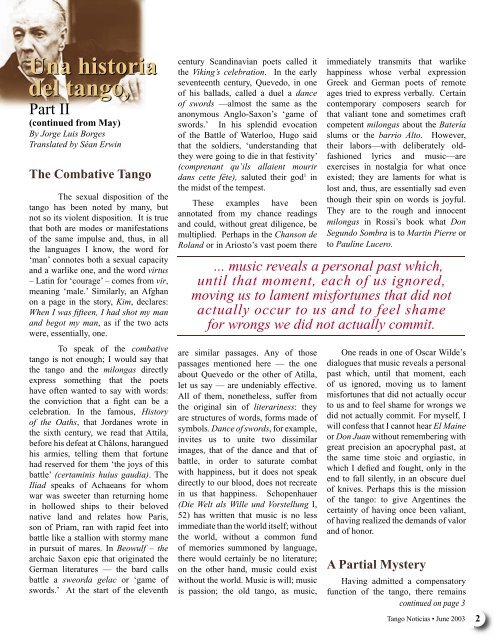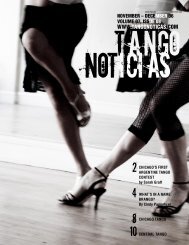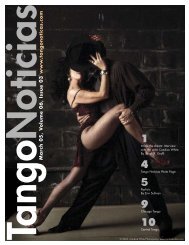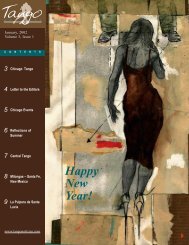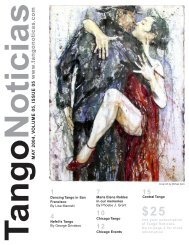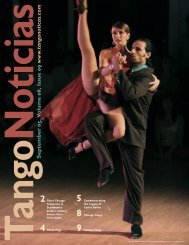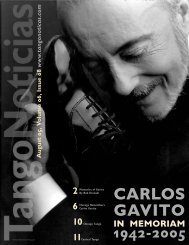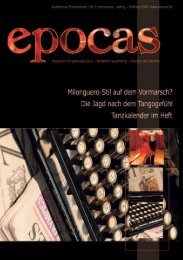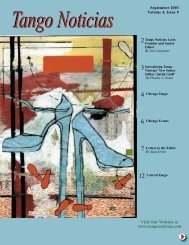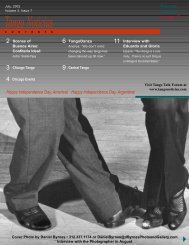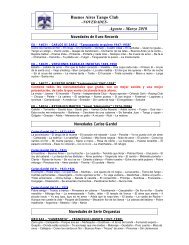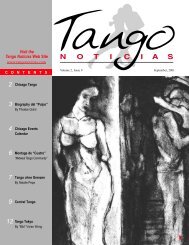You also want an ePaper? Increase the reach of your titles
YUMPU automatically turns print PDFs into web optimized ePapers that Google loves.
Una historiadel tango,Part II(continued from May)By Jorge Luis BorgesTranslated by Séan ErwinThe Combative TangoThe sexual disposition of thetango has been noted by many, butnot so its violent disposition. It is truethat both are modes or manifestationsof the same impulse and, thus, in allthe languages I know, the word for‘man’ connotes both a sexual capacityand a warlike one, and the word virtus– Latin for ‘courage’ – comes from vir,meaning ‘male.’ Similarly, an Afghanon a page in the story, Kim, declares:When I was fifteen, I had shot my manand begot my man, as if the two actswere, essentially, one.To speak of the combativetango is not enough; I would say thatthe tango and the milongas directlyexpress something that the poetshave often wanted to say with words:the conviction that a fight can be acelebration. In the famous, Historyof the Oaths, that Jordanes wrote inthe sixth century, we read that Attila,before his defeat at Châlons, haranguedhis armies, telling them that fortunehad reserved for them ‘the joys of thisbattle’ (certaminis huius gaudia). TheIliad speaks of Achaeans for whomwar was sweeter than returning homein hollowed ships to their belovednative land and relates how Paris,son of Priam, ran with rapid feet intobattle like a stallion with stormy manein pursuit of mares. In Beowulf – thearchaic Saxon epic that originated theGerman literatures — the bard callsbattle a sweorda gelac or ‘game ofswords.’ At the start of the eleventhcentury Scandinavian poets called itthe Viking’s celebration. In the earlyseventeenth century, Quevedo, in oneof his ballads, called a duel a danceof swords —almost the same as theanony mous Anglo-Saxon’s ‘game ofswords.’ In his splendid evocationof the Battle of Waterloo, Hugo saidthat the soldiers, ‘understanding thatthey were going to die in that festivity’(comprenant qu’ils allaient mourirdans cette fête), saluted their god 1 inthe midst of the tempest.These examples have beenannotated from my chance readingsand could, without great diligence, bemultiplied. Perhaps in the Chanson deRoland or in Ariosto’s vast poem thereare similar passages. Any of thosepassages mentioned here — the oneabout Quevedo or the other of Atilla,let us say — are undeniably effective.All of them, nonetheless, suffer fromthe original sin of literariness: theyare structures of words, forms made ofsymbols. Dance of swords, for example,invites us to unite two dissimilarimages, that of the dance and that ofbattle, in order to saturate combatwith happiness, but it does not speakdirectly to our blood, does not recreatein us that happiness. Schopenhauer(Die Welt als Wille und Vorstellung I,52) has written that music is no lessimmediate than the world itself; withoutthe world, without a common fundof memories summoned by language,there would certainly be no lit erature;on the other hand, music could existwithout the world. Music is will; musicis passion; the old tango, as music,immediately transmits that warlikehappiness whose verbal expressionGreek and German poets of remoteages tried to express verbally. Certaincontemporary composers search forthat valiant tone and sometimes craftcompetent milongas about the Bateríaslums or the barrio Alto. However,their labors—with deliberately oldfashionedlyrics and music—areexercises in nostalgia for what onceexisted; they are laments for what islost and, thus, are essentially sad eventhough their spin on words is joyful.They are to the rough and innocentmilongas in Rossi’s book what DonSegundo Sombra is to Martin Pierre orto Pauline Lucero.... music reveals a personal past which,until that moment, each of us ignored,moving us to lament mis fortunes that did notactually occur to us and to feel shamefor wrongs we did not actually commit.One reads in one of Oscar Wilde’sdialogues that music reveals a personalpast which, until that moment, eachof us ignored, moving us to lamentmis fortunes that did not actually occurto us and to feel shame for wrongs wedid not actually commit. For myself, Iwill confess that I cannot hear El Maineor Don Juan without remembering withgreat precision an apocryphal past, atthe same time stoic and orgiastic, inwhich I defied and fought, only in theend to fall silently, in an obscure duelof knives. Perhaps this is the missionof the tango: to give Argentines thecertainty of having once been valiant,of having realized the demands of valorand of honor.A Partial MysteryHaving admitted a compensatoryfunction of the tango, there remainscontinued on page 3Tango Noticias • June 20032


